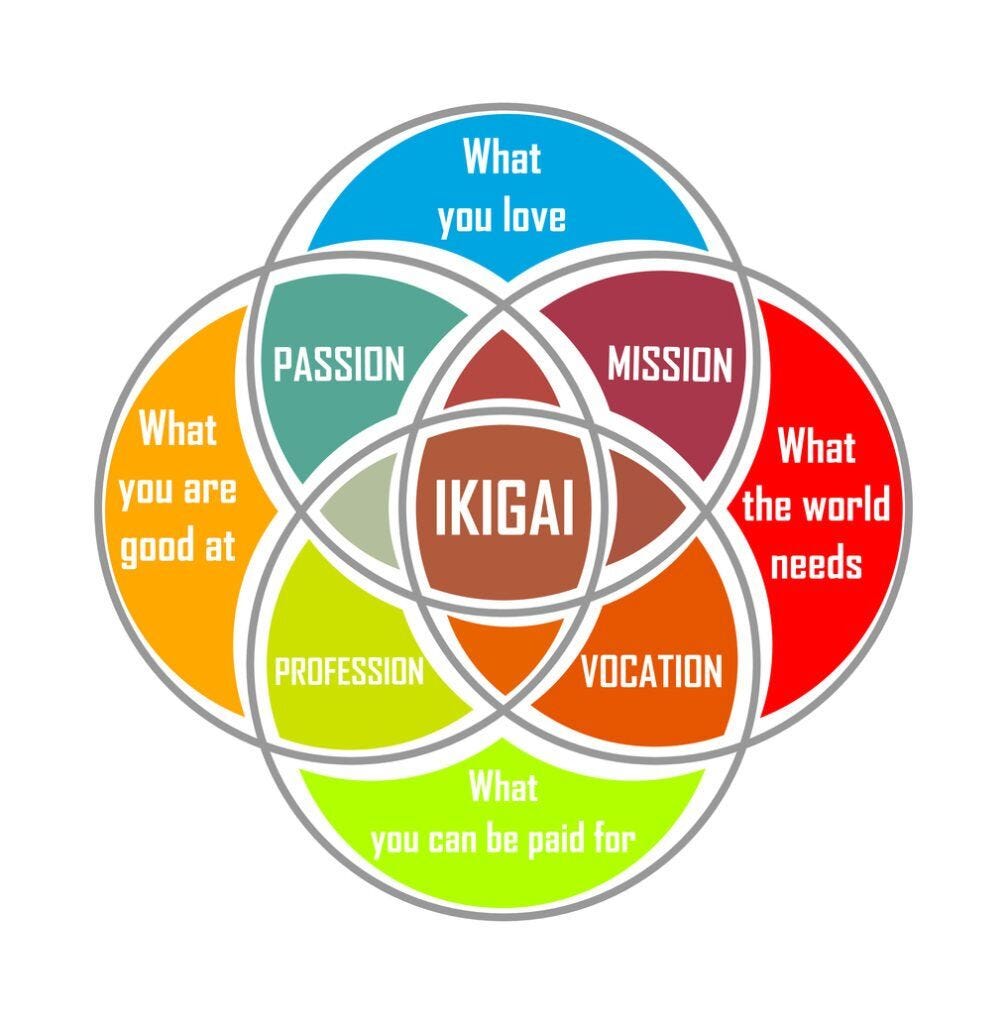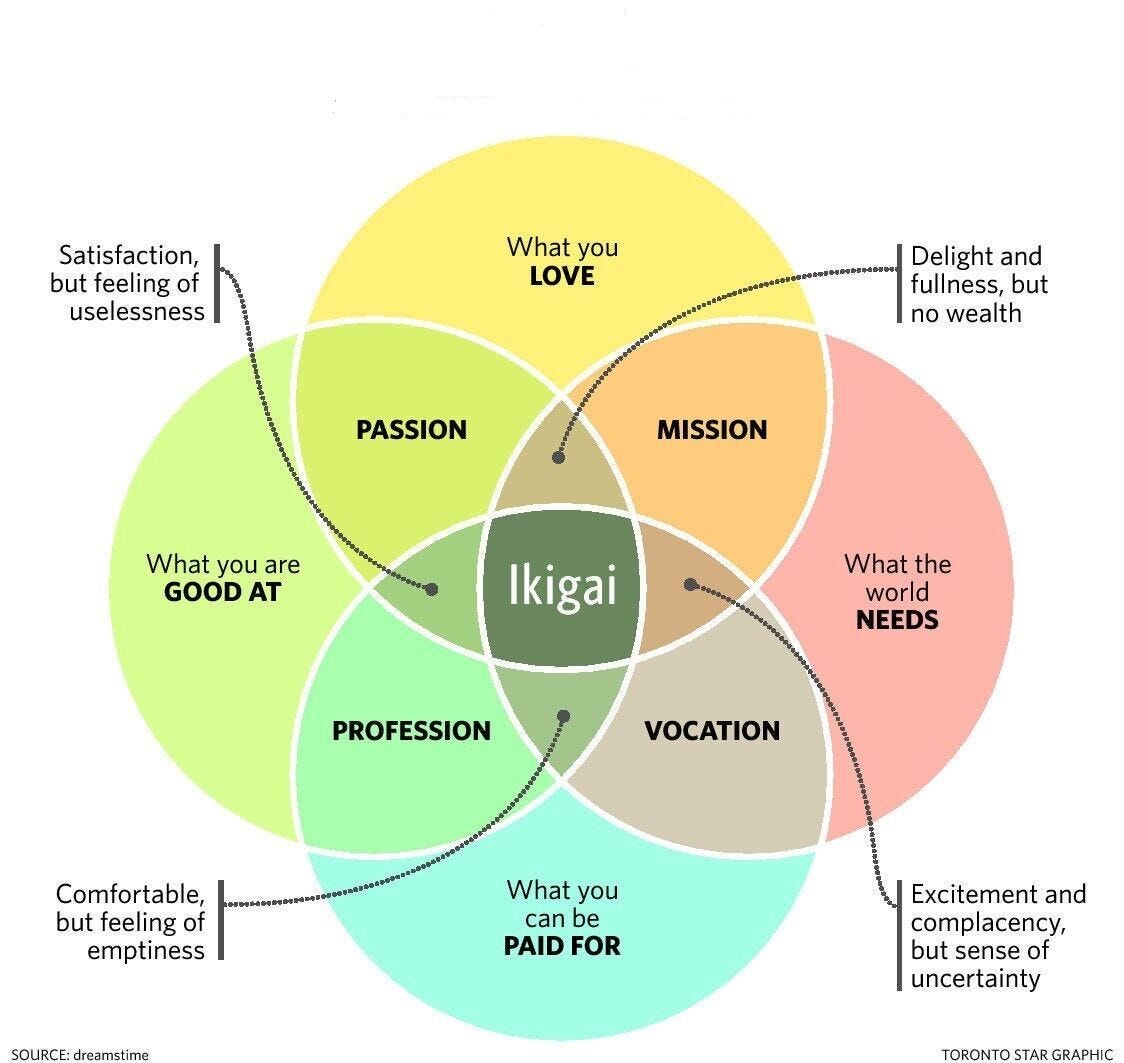Ikigai and the Mexican fisherman

“When I was 5 years old, my mother always told me that happiness was the key to life. When I went to school, they asked me what I wanted to be when I grew up. I wrote down ‘happy’. They told me I didn’t understand the assignment, and I told them they didn’t understand life.” — John Lennon
Recently we have stumbled upon two articles we liked a lot and made us ponder. The first being the explanation of the Japanese concept Ikigai that highlights the relevance of knowing your reason for living; the second is the parable of the Mexican fisherman whose life being led in a simple way could already be his ultimate nirvana.
What impressed us from these two topics apparently distant from each other from a geographical perspective as well as from a narrative style (the first being a non-fiction article based on a study and the second a modern fable) is how they turn out to be tightly connected.
Let’s start by having a closer look at Ikigai. Ikigai is your reason to jump out of bed each morning, it’s something it could make you truly happy.
Millions of people in Japan have an Ikigai and it originally comes from the island of Okinawa where the highest percentage of centenaries in the world reside — 24 centenaries every 100.000 inhabitants can be found there, four times the world average.
According to a study conducted by Hector Garcia and Francesc Miralles and published in their book: “Ikigai — The Japanese secret to a long and happy life”, such astounding results are linked to a simple life led outdoor, a healthy nutrition and a dedication to human connections, especially friendships. So far so good, as most of us acknowledge these three areas as essential for a healthy life. What’s far less predictable is how the fourth and last secret ingredient is Ikigai.
Some people identify their own Ikigai naturally and without any efforts as they chase their dreams as far back as from their childhood. In their case, determination and perseverance will be key qualities to allow them to stay focused on their Ikigai.
But not everyone has clear ideas on what they want to achieve in life, sometimes not even in adulthood. For those people, finding their Ikigai is a true dilemma. In this case what is recommended is to stay open minded and maintain high levels of curiosity to foster exploration of new areas, new activities and new passions.
But how is it possible to have a more methodical approach to the search for Ikigai? And how will you know for sure that you will have found it?
Ask yourself these questions and the answer that will match all four of them will be your Ikigai:
What do I love?
What am I good at?
What does the world need?
What can I get paid for?
The graph below shows how Ikigai is the convergence of 4 well defined pillars: passion, mission, profession e vocation, each of them a combination of what the individual can or aspire or offer to the world and what the world needs or can offer.

In other words, Ikigai can be considered to be the perfect alignment of the interests and the well being of both the individual and the community.
And maybe it’s exactly for this reason that having a goal in life and pursuing what we love has a strong impact on the balance, life expectancy and happiness of every human being as much as healthy food, physical activity and human relations.
In this short story that we recommend you to read to understand even better our observations, a strong moral can be found.
The concept of living in a balanced way comes up in this story as well. What we also find here is a crossroads, a life choice, that potentially anyone could face at some point: pursuing an unchecked ambition or living simply and finding joy in the small things.
The parable introduces a Mexican man who earns his living from fishing. Despite working moderately he manages to support his family’s immediate needs. He dedicates the remaining of his free time to friends, family, siesta and music. The fisherman is leading a happy life and is aware of it. One day he meets an American investment banker in the harbor who offers the fisherman ideas to turn ultra rich. The strategy requires hard work, sacrifices such as moving away from his village and especially a lot of time. It turns out that the final objective of this strategy is for the fisherman to lead the exact same lifestyle he is already leading now. Essentially he would sacrifice 20 of his best years just to follow a blind ambition, and this for the fisherman is out of question.
Following the recipe of long life described by Hector Garcia and Francesc Miralles, we can agree upon that the likelihood of this Mexican fisherman to join the centenaries’ club are very high: he goes out to sea or goes to the beach, therefore he is in touch with nature; he eats healthy food — his fish for example is top quality; he spends a lot of time to human relations: he plays with his children, takes naps with his wife and hangs out with friends in the evening.
The Mexican fisherman turns down dreams of power and wealth exactly because he clearly knows what his Ikigai is, clearly being a fisherman, and especially how it fits in a precise balance with the other 3 elements.
By following the graph above and applying it to the fisherman’s situation, we see how the fisherman is able to answer to all four questions:
What could I offer to the world? → The world needs fish to eat;
In exchange of what I would like to have a monetary compensation? → He supports himself and his family’s needs from fishing;
What do I do well? → Fishing comes easy to this man, evidence of which is he can stay out in the sea for “a little while” and still manages to catch wonderful fishes;
What do I love? → He loves fishing, in fact he mentions it in list of hobbies.
In case the American investment banker would have convinced the Mexican fisherman to undertake a capitalistic journey and leave behind his simple and agreeable life, the fisherman could answer positively to the first two questions (he would continue providing fish to the world and he would earn even more money) and to the third (in case he has natural entrepreneurial skills) but he wouldn’t love his day to day and this would leave him with a feeling of emptiness (illustrated in the bottom intersection in the graph below)

The Mexican fisherman proves himself wise in turning down the American investment banker’s suggestions and his story helps us to meditate on the meaning of life. The fisherman is happy and he is aware of it: all he has to do is to maintain his direction. For all of you who haven’t yet found such bliss, some actions we would recommend are to stop your routine sometimes, reflect about where the journey is taking you and wonder about the deep meaning of your actions and choices.
Additionally, we believe that Hector Garcia and Francesc Miralles can help all of us with the 10 golden rules they have outlined in their book to extend anyone’s life and be happy:
1. Stay active and don’t retire
2. Leave urgency behind and adopt a slower pace of life
3. Only eat until you are 80 per cent full
4. Surround yourself with good friends
5. Get in shape through daily, gentle exercise
6. Smile and acknowledge people around you
7. Reconnect with nature
8. Give thanks to anything that brightens our day and makes us feel alive.
9. Live in the moment
10. Follow your ikigai
As much as these rules are extraordinary, we are well aware of how daily duties can be overwhelming and how hard it is to keep balance in your life. We think this is exactly the key word: “balance”. For example, pursuing wealth is the right thing to do as long as enough attention and focus is dedicated to the other areas of life. How is it then possible to live like the Mexican fisherman who probably follows all the right rules mentioned above, except maybe number 3? Is it a Utopian dream?
Here at Edo Agenda, we believe that a personal organization handled in a smooth and intuitive manner and especially that mirrors our mindset could truly optimize productivity, manage our time best, remove stress we place on ourselves, tackle priorities with ease (such as the 10 golden rules above) and therefore put us in a condition to live with greater balance.
Experience Edo Agenda: we won’t be able to unveil your Ikigai, but we will enable you to pursue it.

/image%2F3369881%2F20190511%2Fob_2322f5_70.gif)


/https%3A%2F%2Fgame-tool.rocks%2Fimg%2Fh3.png)
